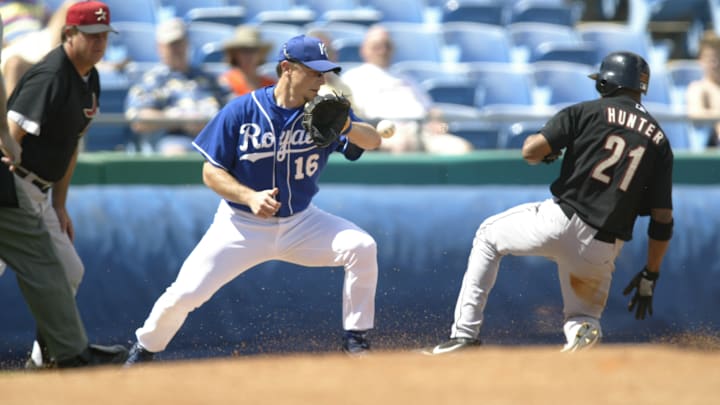Welcome back to Kings of Kauffman writer Patrick Glancy's series focusing on the popular Immaculate Grid game and Royals players. Featured today is Joe Randa.
This edition of KC Royals Immaculate Grid Cheat Codes features an overlooked player in the team's history. Nicknamed "The Joker", Joe Randa generally doesn't get the credit he deserves from Royals fans.
Attribute that to to bad timing.
Had Randa played during a more competitive period in Royals history, he might be a semi-beloved figure like fellow third basemen Kevin Seitzer and Mike Moustakas. Alas, Randa's Royals didn't post a lot of wins, and he's been unfairly marginalized. That doesn't mean he can't be a useful piece for Immaculate Grid players, however.
The joke's on KC Royals fans who overlook Joe Randa
Randa debuted for the Royals in late 1995, eventually taking over for Gary Gaetti at the hot corner. He lacked Gaetti's pop at the plate, but the two shared many traits, including a foundation of fundamental skills reinforced by a strong work ethic and unquestioned intangibles.
Unfortunately, Kansas City traded Randa to Pittsburgh after the 1996 season for Jay Bell and Jeff King. The Royals were seduced by King's superior power, but he reportedly disliked baseball and retired in May of 1999, several months after the club reacquired Randa in a trade with the Mets.
Randa, on the other hand, played with an infectious charisma and enjoyed some of his best seasons after returning to Kansas City, where he made his mark in Royals history.
The 1999 season was Randa's best—he posted an .836 OPS with 16 home runs, 84 RBI, and 36 doubles. He might not have had the power to put the ball over the wall like a true slugger, but he was a doubles machine. While the baseball world at large seemed preoccupied with steroids and homers, Randa went about his business with a smile and quietly raked.
He was also a key member of the 2003 team that made a surprising run at the American League pennant only to fall just short. That season proved to be one of the lone bright spots in decades of Royals' futility, and he hit 16 home runs, drove in 72 runs, and smacked 31 doubles. (The only time Randa would reach the postseason in his career was as a member of the Padres in 2005).
Randa was never an All-Star, and his trophy case is not overflowing with awards, but that doesn't mean he didn't accomplish many milestones useful to Immaculare Grid players and general baseball trivia enthusiasts. For example, he never won a Gold Glove, but he did set the Royals team record for most consecutive games without an error by a third baseman (75). Considering some who've played third base for the Royals, that's impressive.
He is also one of the only three Royals to record six hits in a nine-inning game; the others Seizter and Bob Oliver. Randa achieved the feat in the first game of a doubleheader against Detroit in 2004, a contest that turned into a memorable 26-5 shellacking of the Tigers. And even though it happened as a member of the Pirates during his final season in 2006, here's a fun KC-connected fact about Randa: that season, he broke up a no-hitter by future Royals World Series champion Chris Young with a ninth-inning pinch-hit home run.
Why Joe Randa makes sense for the Immaculate Grid
But what makes Randa so useful for the Immaculate Grid? For starters, he played for five teams in his 12-year career. After debuting with the Royals, he played for Pittsburgh, Detroit, and again for Kansas City for most of his prime before finishing up with Cincinnati, San Diego, and a reunion with Pittsburgh. He hit over .300 four times, topped 100 RBI in 2006, and blasted 30 or more doubles six times, including in 2005 when he hit 43.
Randa will never be front-and-center in Royals lore, and that's OK. No one is trying to put him on the same level as George Brett or Salvador Perez. But if you were a Royals fan in the lean years between the early 1990's and the resurgence that began in 2013, he was someone worth watching, which is more than can be said for many of his teammates. For that alone, he deserves some love from the Royals fanbase. At the very least, keep him in mind the next time you play the Grid.
